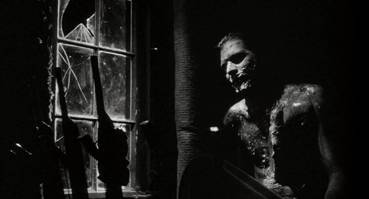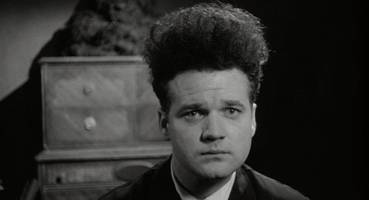Part
2: The Film – "Oh, you are sick" |
The
opening scene of Eraserhead plays almost
like an initiation test for what follows – if you can
deal with this you're in with a chance, and if you're excited
by it then you're in for a treat. A literal description of
what unfolds would serve little purpose but to further
bemuse newcomers to the film. It involves the floating,
worried face of lead character Henry Spencer,
an embryonic creature with a long tail, a dark and barren
planet and a disfigured man who operates a set of old-fashioned
signal box levers, which release the creature from the position it has
taken up alongside (or perhaps inside of) Henry and plunge
it into a pool of silvery liquid. It will likely make absolutely
no sense at all to newcomers
to the film, and I was several viewings in before it dawned on me that what I was watching was a symbolic representation of conception and birth. But if feels extraordinary. The sense that
we are in a dark but very tangible part of someone's subconscious
is electrifying. When a small white hole appears in a
dark wall and the camera moves towards it, the feeling that we are about to embark on a strange and disturbing
journey is overwhelming.
We
emerge into the real world, or at least a skewed approximation
of it. Henry Spencer is walking home from work, an everyday activity that is nonetheless tinged with peculiarity. The landscape is bleak and unsettling and the soundtrack
dominated by the chug of industrial machinery.
Henry walks as if he is constricted by his clothing, taking
small but rapid steps, walking up and down mounds of gravel
like a curious child. He looks worried. He always looks
worried. Henry is not a man who seems remotely comfortable with
his world and when
you see where he lives it's hardly surprising. His tiny
apartment is dominated by an old, brass-ended bed, a small table,
and an antique dresser. Almost no natural light enters the
room and the uplighters on the wall leave whole parts of it in virtual
darkness. In place of pot plants there are piles of bracken
and earth, an old record player churns out Fats Waller
pipe organ music, and a huge steam-fed radiator hisses
and clunks at a distracting volume.

If
Henry is not exactly at one with himself or his world
he is every bit as uncomfortable with others. On arriving
home he is informed by his alluring neighbour, who is named in the credits simply as Beautiful Girl Across
the Hall, that a girl named Mary has called to invite him
to dinner at her parent's house that evening. Henry stares
at her with a mixture of alarm and embarrassment, then,
with a insincerely mumbled thank-you, retreats into his
apartment. The message suggests that Henry has a girlfriend,
which is difficult to imagine without visual aids. In a very
neat piece of visual exposition, we gather that they are
going through difficult time, suggested when Henry scurries around a drawer full of oddities and retrieves and examines both halves of Mary's torn-in-two
photo.
The
above textual description may create a sense of the strangeness
of Henry's world, but not how genuinely nightmarish or how darkly, unexpectedly beautiful it is. Gorgeously
lit and shot by Herbert Cardwell and, when the production
ran past its first nine months (it was to take an eventual
five years), Frederick Elmes, the imagery is a celebration of
the unique exquisiteness of black and white, its noir-like
use of light and shadow sitting alongside Lynch's first experiments
with pushing light levels down so that images only just
register on film, which is later taken close to its limit in Lost
Highway.
And
then there's the sound. Oh, the sound.
With
the (often memorable) dialogue kept to a minimum and the music
restricted to the distant strains of Fats Waller and sinister
electronic hums and bells, it is the unique ambient sound that provides the film with its most
powerful tool for assaulting the collective subconscious of its audience.
Henry is never left in silence – whether it be the hissing
of steam, the chugging of distant industrial machinery, the mournful
wailing of factory hooters, the sparking of faulty electricity,
the howling of wind or even the bubbling of a hydrator,
Henry's world is never an even remotely comfortable place
to be, the soundtrack creating a constant sense of unease that feels
directly tapped into our darkest dreams. I've lost
count of the number of times that people have said to
me, after watching the film, that so much of it seems
creepily familiar, that it captures with disturbing accuracy what it feels like to have a nightmare. It
is this that makes Eraserhead, even after
forty or so viewings (yes, I really have seen it that
many times), a still troubling place to visit.
Things
really move into nightmare territory when Henry arrives at Mary's house. Assaulted by the sounds of interior plumping,
exterior industrial mechanics and the high-pitched squeaks
of young suckling puppies, he is humourlessly
questioned by Mary's mother regarding his job ("What
do you do?" – "Oh, I'm on vacation." –
"What did you do?"), is momentarily thrown when
Mary suffers a sudden but thankfully short-lived fit, and is introduced to Mary's father
Bill, a wide-eyed evangelist for the work of the plumbing industry. He never
gets to meet the grandmother, who sits catatonically in
the kitchen and whose arms are manipulated by her daughter
to toss the salad (at one hostile screening of the film,
the sight of her prompted a dismayed female viewer to
cry out, "Oh God, not another one!").

But
it's at dinner that, even by Henry's standards, things take a bizarre
turn. Asked to carve up the smallest chicken Bill has
ever set eyes on ("Little damned things, smaller
than my fist. But they're new!"), Henry is frozen
in mid-movement when the creature begins moving its legs
and pumping out blood, prompting a peculiarly orgasmic
response from Mary's mother and sending Mary crying from
the room. If the film hasn't driven you from the cinema
by now, this is the acid test, the point at which you'll
either go with Lynch or throw your hands in the air and
your towel into the ring. All
of this is a prelude to the revelation that Mary has given
birth and that Henry is the father. Henry doesn't understand
how this can have happened so soon after they slept together,
but Mary's mother tells him it's premature. Mary, more
ominously, blurts out that "They're not even sure
it is a baby!"
The Eraserhead baby is the stuff of cult
and Lynch legend. With it's hairless, lamb-like head
and its bulbous and bandage-wrapped body, this is without
doubt the film's most disturbing creation and one that
Lynch himself has been repeatedly coy about, answering
enquiries about its construction with "It wasn't
made, it was found." But Henry and Mary accept it
for what they believe it is, feeding it and passing it loving
glances as it lies on the on the table in Henry's apartment,
into which the now married couple have moved. The relationship
soon shows signs of strain, as a storm rages outside and
the baby wails all night, reducing a sleepless Mary to a tearful wreck and eventually prompting her to flee
to her mother's for a couple of days, leaving Henry –
on vacation again – to look after the child. By then, Henry's
grasp on reality is starting to give way to increasingly
strange fantasies about a fat-cheeked lady who lives
and performs for him on an old stage inside of the room's
radiator.
If
the imagery and sound make the film a consistently unsettling
experience, what few viewers (myself included) appreciate
on their first viewing, especially those who caught it
on its original release without the benefit of subsequent
Lynch works as reference material, is how genuinely and deliberately
funny some of it is. Now I know that a fair few
of those who have only seen the film once will be double-taking
at that, but this is a view shared by many who have fondly and repeatedly revisited
the film, and fans of Twin Peaks should
certainly recognise the telltale signs of Lynch's twisted humour,
especially (though not exclusively) how it manifests itself in the dialogue and
delivery. Those who have sussed and enjoyed this aspect
of the film will no doubt recognise and respond to the following:
Bill's whole introductory rant, which he attempts to continue even as he is being chased from the room by his wife;
The sarcastic twang to Mary's mother's voice when, having been assured by Mary that Henry is very clever at printing, she coldly responds, "Yes, he sounds very clever";
Bill passing a pregnant pause by cheerfully asking "Well Henry, what do you know?" only to have Henry squirm uncomfortably and take the small talk seriously with, "Oh...I don't know much of anything...." as Bill continues to grin maniacally at him;
The superb visual gag that sees Mary lean down and repeatedly shake the bed in which Henry is laying in what appears to be an act of madness, but which proves to have genuine purpose;
Henry's unflustered moment of realisation – "Oh you are sick" – as his baby spontaneously breaks out in alarming facial sores;
Henry looking around him in confusion for Mary following an enquiry from The Beautiful Girl Across the Hall about her whereabouts;
The high-pitched, whining "Nooooo!" that escapes Henry when asked if he minds getting married.
And
so on. None of which exactly makes Eraserhead a barrel of laughs, but its does run against the claims
of my ex-film lecturer, and a fair few others, that the
film is unremittingly bleak. It is dark and it is disturbing,
but it is also wonderfully imaginative, artistically breathtaking
and, yes, nicely twisted fun.
But
is this weird for weird's sake or is there something more
complex, more meaningful going on here? Lynch himself
has consistently refused to supply his own interpretation,
and in the accompanying documentary teasingly claims that
no review or article he has read has ever understood
the film as he sees it. Of the numerous attempts to analyse
the film's for deeper meaning, one in particular tends to reoccur
and certainly makes as much sense as any other I've come
across, and in Part 3 I'll be attempting to pick this apart.
It
should be noted that in doing so I will be discussing
the film's final scene and even the ending, so if you're new
to the film or have seen it and would like a go at working
it out for yourself, you might want to skip straight to
the DVD details.
|